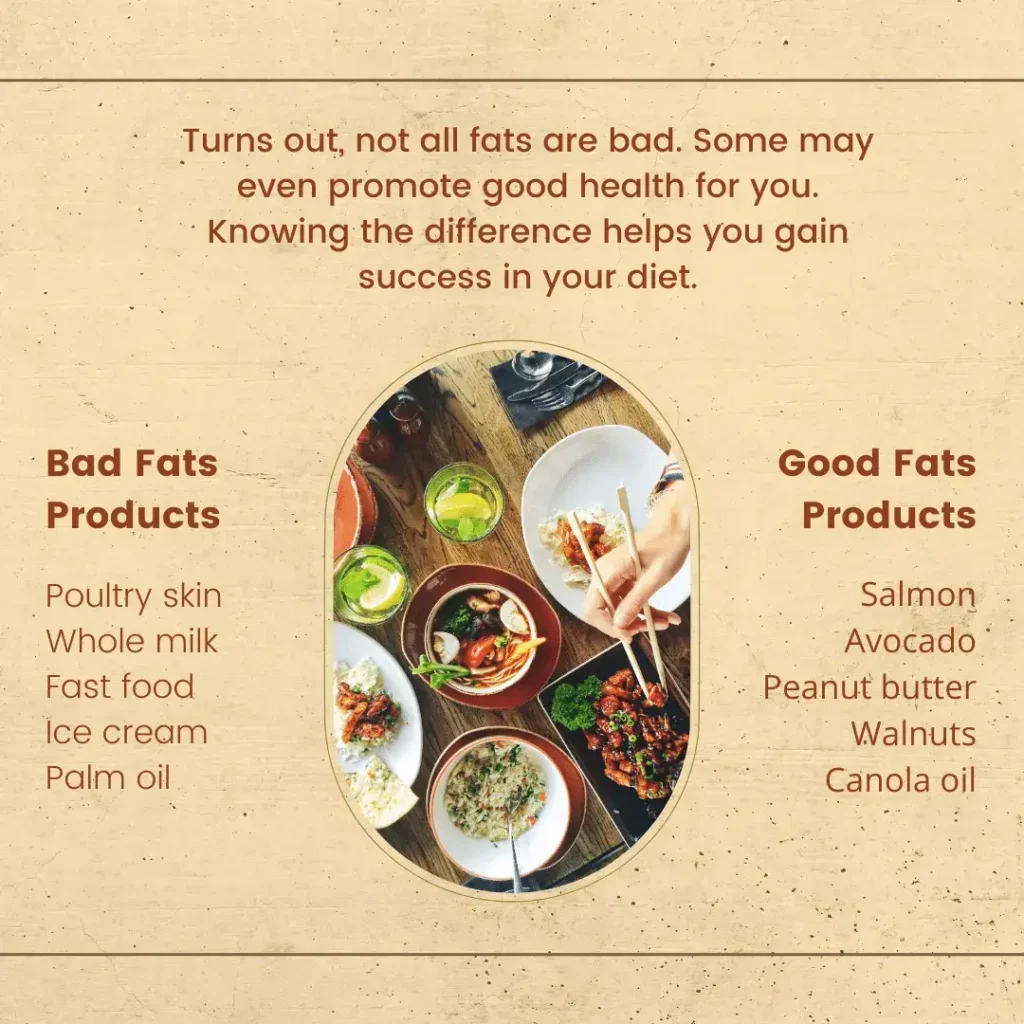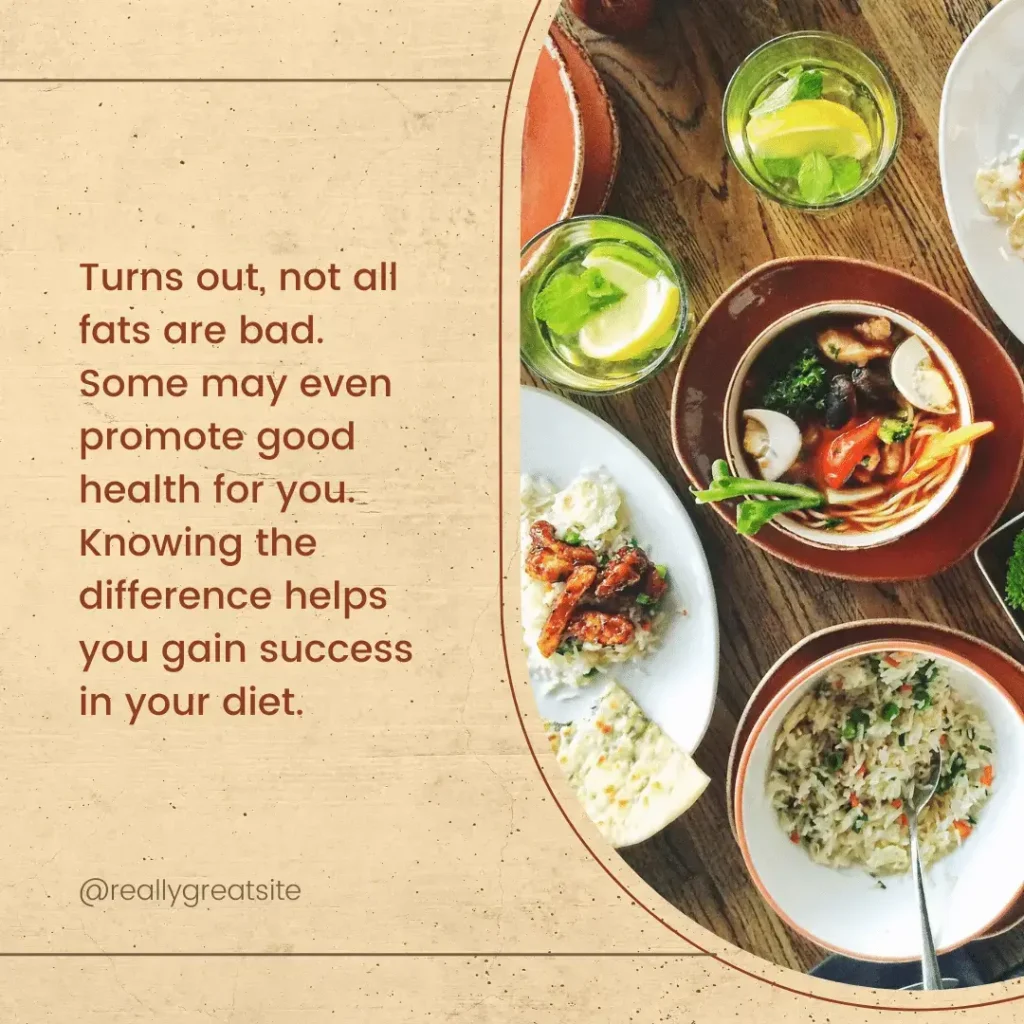Greetings, dear readers. I’m here to take you on a journey through the intricate landscape of dietary fats within the context of our health, exploring the 4 important functions of fats along the way. Join me as we delve deep into the multifaceted roles that fats play in our bodies, dispelling myths, and uncovering the fascinating truths.



Challenging the Fat Fallacy: An Introduction Of 4 Important Functions of Fats
For far too long, dietary fats have been vilified, cast as the culprits behind weight gain and a range of health problems. In this section, we’ll unravel the misconceptions surrounding fats and recognize their essential role in our daily diet
Challenging the Fat Fallacy: An Introduction
Dietary fats have faced unwarranted criticism, with a long history of being blamed for health issues such as obesity and heart disease. However, these misconceptions fail to acknowledge the complex and vital roles fats play in our bodies.
In reality, fats are one of the three essential macronutrients, along with carbohydrates and proteins, and they are indispensable for our overall well-being. Fats go beyond being mere sources of energy; they are intricate molecules that fulfill multiple functions, including the 4 important functions of fats from constructing cellular frameworks to facilitating the absorption of vital vitamins.
While carbohydrates offer immediate energy, fats act as our body’s enduring energy source. In this section, we’ll explore how fats are stored and used to provide sustained energy.
Fats: Nature's Enduring Energy Reservoir
When we think of energy, carbohydrates often come to mind as the primary source of quick fuel. However, fats play a crucial role as our bodies’ long-term energy reservoir.
Fats find their home in adipose tissue, serving as a reservoir of energy. When we consume more calories than our bodies require for immediate energy, the surplus calories are transformed into triglycerides and stashed away in adipose tissue. This stored fat becomes accessible when our bodies need energy between meals or during prolonged physical activity.

21 DAYS
TO A SLIMMER, SEXIER YOU!
THE SMOOTHIE DIET is a revolutionary new life-transformation system that not only guarantees to help you lose weight and feel better than you have in years, it also promises to eliminate more body fat – faster than anything you’ve tried before.
The Blueprint of Life: Fats in Cellular Architecture
Our cells are the building blocks of life, and fats are integral to their structure. In this section, we’ll delve into the role of fats in cell membranes and their significance for cellular health and function.
Fats: The Architects of Cellular Life
Cells are the fundamental units of life, and their structure is crucial for their function. Fats, particularly phospholipids, play a pivotal role in this structure by forming the cell membrane—a lipid bilayer that envelops and safeguards the cell’s contents.
The composition of fats in the cell membrane influences its fluidity and flexibility, which, in turn, affects cellular functions. Fats act as the bricks and mortar of our cellular architecture, ensuring cells remain stable and functional.
The Cozy Insulators: Fats and Temperature Regulation
Have you ever wondered how your body stays warm in cold weather? Fats play a pivotal role in regulating body temperature and safeguarding vital organs. In this section, we’ll explore these fascinating functions.
Fats: The Nature's Insulators and Cushions
Fats serve as natural insulators, helping our bodies regulate temperature, especially in cold environments. They form a layer beneath the skin, acting as an insulating barrier that prevents excessive heat loss, ensuring we stay warm and cozy.
Furthermore, fats play a crucial protective role by enveloping vital organs. Adipose tissue, rich in fats, acts as a cushion, safeguarding organs such as the heart and kidneys from physical impact. It’s akin to a natural shock absorber, ensuring our organs remain safe and function optimally.
Certain vitamins are not water-soluble; they are fat-soluble, meaning they are best absorbed in the presence of dietary fats. In this section, we’ll delve into the concept of fat-soluble vitamins (A, D, E, K) and how fats facilitate their absorption and utilization.
Liv Pure
Lean Belly
Exipure
Fats: The Key to Unlocking Nutrient Treasure
Some vitamins are not water-soluble; they are fat-soluble, namely Vitamins A, D, E, and K. These vitamins are indispensable for various bodily functions, including vision, bone health, immune function, and blood clotting.
However, these fat-soluble vitamins cannot be effectively absorbed by the body without the presence of dietary fats. Fats in our diet act as the key to unlock the treasure trove of these essential nutrients, facilitating their journey through the digestive system and into the bloodstream, where they can be harnessed for their specific functions.
The Wise Choice: Selecting Healthy Fats
Not all fats are created equal. In this section, we’ll distinguish between beneficial and detrimental fats, identifying sources of unsaturated and polyunsaturated fats that promote overall health.
Healthy Fats: Nurturing Our Bodies
While fats are essential, it’s crucial to differentiate between healthy and unhealthy fats. Healthy fats, such as monounsaturated and polyunsaturated fats, can be found in foods like avocados, nuts, seeds, and fatty fish. These fats offer a plethora of health benefits and should be embraced as part of a balanced diet.
On the other hand, unhealthy fats, such as saturated and trans fats, are often found in processed and fried foods and should be consumed in moderation to mitigate potential health risks.
Moderation Matters: Navigating Fat Consumption
Even though fats are essential, overconsumption can lead to health issues. In this section, we’ll highlight the potential risks associated with excessive fat intake and provide guidelines for moderation.
The Perils of Excessive Fat Consumption
Excessive fat intake is linked to obesity, heart disease, and elevated cholesterol levels. It’s imperative to moderate fat consumption and maintain a balanced diet that encompasses all essential nutrients in the appropriate proportions.
Balancing Act: Crafting a Wholesome Diet
A balanced diet is the cornerstone of overall well-being. In this section, we’ll emphasize the importance of balancing fats, carbohydrates, and proteins for optimal health.
Balancing Act: Fats in the Dietary Symphony
A balanced diet is the key to good health. Fats, together with carbohydrates and proteins, form the triumvirate of nutrition. Each macronutrient plays a unique role in nourishing our bodies, including the 4 important functions of fats and achieving harmony among them is paramount for our well-being.
Culinary Delights with Healthy Fats: Tips and Techniques
Cooking with healthy fats can elevate both the flavor and nutrition of your meals. In this section, we’ll provide practical advice on using healthy fats for cooking and flavour enhancement.
Cooking with Fats: A Fusion of Art and Science
Cooking with healthy fats can transform your culinary experiences. When used judiciously, fats can enhance the flavor and texture of dishes. Opt for cooking oils such as olive oil or coconut oil to infuse your meals with both taste and health benefits.
Brain Boost: Fats and Cognitive Health
Your brain is a remarkable organ that demands substantial energy, and it relies on fats, especially omega-3 fatty acids, to operate at its best. In this section, we’ll explore the profound impact of fats on cognitive function, including the 4 important functions of fats
Fats and Brain Health: Nourishing the Mind
Omega-3 fatty acids, present in fatty fish like salmon and flaxseeds, play a pivotal role in brain health, enhancing cognitive abilities, memory, and mood regulation. Incorporating foods rich in these fatty acids into your diet can contribute to a sharper mind and improved emotional well-being.
Hormone Harmony: Fat's Role in Regulation
Fats exert a profound influence on hormone production and regulation. In this section, we’ll delve into how fats influence hormones and their far-reaching implications for metabolism, fertility, and overall hormonal health, including the 4 important functions of fats.
Fats and Hormones: Striking the Balance
Fats play a crucial role in the production and regulation of hormones, including sex hormones, thyroid hormones, and insulin, among others. Maintaining a balanced intake of fats is pivotal for overall hormonal health, encompassing the 4 important functions of fats.
The Skin Connection: Fats for a Radiant Complexion
Healthy fats aren’t only beneficial internally; they also work wonders for your skin. In this section, we’ll discuss the role of fats in maintaining skin health and appearance, including the 4 important functions of fats .
Healthy Fats: A Recipe for Radiant Skin
Healthy fats contribute to glowing skin. They help maintain skin moisture, protect against environmental damage, and support a healthy complexion, all encompassing the 4 important functions of fats Including fats in your diet can promote skin health from within.
Omega-3 Wonders: Shielding Against Inflammation
Inflammation is a common factor in various chronic diseases. Omega-3 fatty acids possess potent anti-inflammatory properties. In this section, we’ll explore their benefits in mitigating the risk of chronic diseases, including the 4 important functions of fats .
Omega-3: The Natural Anti-Inflammatory
Omega-3 fatty acids offer formidable anti-inflammatory advantages, playing a significant role in reducing the risk of chronic diseases such as heart disease, arthritis, and inflammatory bowel disease, encompassing the 4 important functions of fats Incorporating omega-3-rich foods into your diet is a proactive step toward better health.
Matters of the Heart: Fats and Cardiovascular Health
The relationship between fats and heart health is intricate. In this section, we’ll investigate the role of fats in heart health and strategies for maintaining a healthy heart, including the 4 important functions of fats .
Heart Health and Fats: Finding the Balance
Balancing the types of fats you consume is vital for heart health, encompassing the 4 important functions of fats Prioritizing unsaturated fats while minimizing saturated fats can contribute to a healthier heart. We’ll explore this delicate equilibrium in detail.
Conclusion: Embracing Fats for Holistic Well-being
In conclusion, fats are not the dietary villains they were once thought to be. They serve crucial functions in our bodies, from providing energy to supporting cellular structure, nutrient absorption, and more, including the 4 important functions of fats. To embrace fats for holistic well-being, it’s essential to understand their roles, select healthy fats, and consume them in moderation as part of a balanced diet.
FAQs
1.Is it advisable to completely eliminate fats from my diet for weight loss?
While reducing unhealthy fats is recommended, eliminating fats entirely is not advisable. Fats are essential for various bodily functions and overall health.
2.What are some sources of healthy fats?
Healthy fats can be found in avocados, nuts, seeds, olive oil, fatty fish like salmon, and flaxseeds, among others.
3.Are all saturated fats unhealthy?
Not all saturated fats are equal. Some, like those found in coconut oil, may have health benefits when consumed in moderation. However, it’s essential to prioritize unsaturated fats.
4.How can I incorporate more omega-3 fatty acids into my diet?
Include fatty fish, such as salmon and mackerel, walnuts, flaxseeds, and chia seeds in your meals to boost your omega-3 intake.
5.What are the healthiest cooking oils to use?
Olive oil, avocado oil, and coconut oil are among the healthiest options for cooking, chosen for their taste and health benefits.


